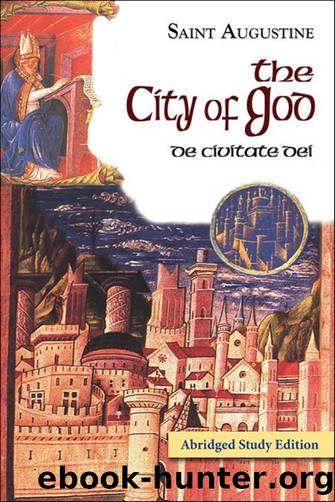The City of God Abridged Study Edition by Augustine Saint

Author:Augustine, Saint [Augustine, Saint]
Language: eng
Format: epub
Publisher: New City Press
Published: 2018-09-16T16:00:00+00:00
* * *
1 . By ârational mortalsâ Augustine of course means human beings, as he also does in Order II,11,31 and The Magnitude of the Soul 25,47. Aristotle, Nicomachean Ethics I,13, is the most apt source of the expression, although the text there does not include the notion of mortality.
2 . The triad of eternity, truth and love ( aeternitate veritate caritate ) here repeats the same triad above at XI,28.
3 . See Ps 73:28.
4 . âWisdomâ¦to be wiseâ: sapientiaâ¦sapere .
5 . âBeingâ¦to beâ: essentiaâ¦esse . Despite Augustineâs claim that essentia was a new word, in fact its existence seems to be traceable back at least six centuries before his use of it. See Quintilian, who attributes it to Plautus (c. 254c. 184 B.C.) in Institutes II,14,2; III,6,23; VIII,3,33.
6 . See Acts 5:39; Rom 5:10.
7 . See Ps 59:9.
8 . See above at XI,13.
9 . See Rom 5:5.
10 . See above at X,6.
11 . See 2 Cor 6:16.
12 . On the God of Socrates 4.
13 . Some editions of The City of God do not begin a new chapter at this point and hence vary by one chapter for the rest of Book XII.
14 . According to the calculations of Eusebius of Caesarea in Chronicles I,18,9, if one were to use information gleaned from the Septuagint, one would note that the period from the creation of Adam to the coming of Christ lasted 5528 years. Assuming that Augustine wrote Book XII around the year 420, this would be approximately fifty years short of 6000.
15 . The letter was a fabrication.
16 . This opinion was that of Epicurus. See Diogenes Laertius, Lives of Eminent Philosophers X,45. But Augustine probably knew of the same view as attributed to Origen. See Origen, On First Principles II,3,1; Jerome, Letter 124,5.
17 . See Timaeus 28a-b.
18 . See above at XI,5-6.
19 . This was a common theme of the early Greek philosophers and is suggested in Plato, Meno 81bc; Phaedo 72a-c.
20 . See Rom 11:33.
21 . This was Origenâs position in On First Principles II,9,1; III,5,2; IV,4,8.
22 . See Timaeus 34b-36d.
23 . The triad of eternity, truth and happiness ( aeternitate veritate felicitate ) suggests the divine Trinity.
24 . See Jn 14:6.
25 . See above at X,30.
26 . The same distinction between solitary and gregarious animals is made below at XIX,12.
27 . On the kinship of human beings through the first parents, a theme repeated below at XII,28, see also The Catholic Way of Life 30,63; The Excellence of Marriage 1,1. For this commonplace see as well Lactantius, Divine Institutes VI,10; John Chrysostom, Sermon on 1 Timothy 12,4.
28 . See Gn 2:21-22.
29 . See 1 Cor 15:26.
30 . See Gn 1:26.
31 . See Gn 2:21-24.
32 . See Gn 2:21-24.
33 . Augustine has the anthropomorphite error in mind here, as he does in several other places in The City of God .
34 . See Timaeus 41a-43b.
35 . A famous assertion taken from On the Return of the Soul and cited also above at X,29 and below at XXII,12.
Download
This site does not store any files on its server. We only index and link to content provided by other sites. Please contact the content providers to delete copyright contents if any and email us, we'll remove relevant links or contents immediately.
The Lost Art of Listening by Michael P. Nichols(7490)
Why I Am Not A Calvinist by Dr. Peter S. Ruckman(4148)
The Rosicrucians by Christopher McIntosh(3509)
Wicca: a guide for the solitary practitioner by Scott Cunningham(3166)
Signature in the Cell: DNA and the Evidence for Intelligent Design by Stephen C. Meyer(3125)
Real Sex by Lauren F. Winner(3014)
The Holy Spirit by Billy Graham(2944)
To Light a Sacred Flame by Silver RavenWolf(2814)
The End of Faith by Sam Harris(2733)
The Gnostic Gospels by Pagels Elaine(2527)
Waking Up by Sam Harris(2454)
Nine Parts of Desire by Geraldine Brooks(2358)
Jesus by Paul Johnson(2352)
Devil, The by Almond Philip C(2324)
The God delusion by Richard Dawkins(2305)
Heavens on Earth by Michael Shermer(2278)
Kundalini by Gopi Krishna(2180)
Chosen by God by R. C. Sproul(2160)
The Nature of Consciousness by Rupert Spira(2102)
